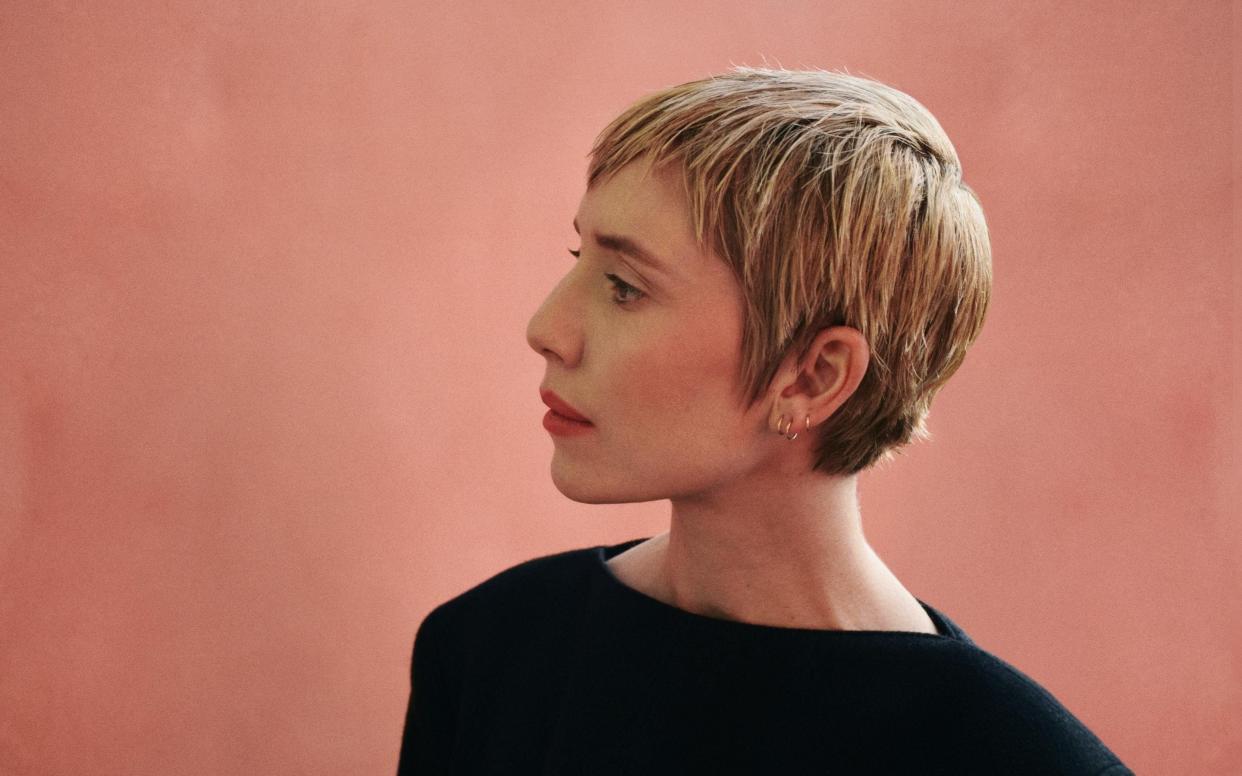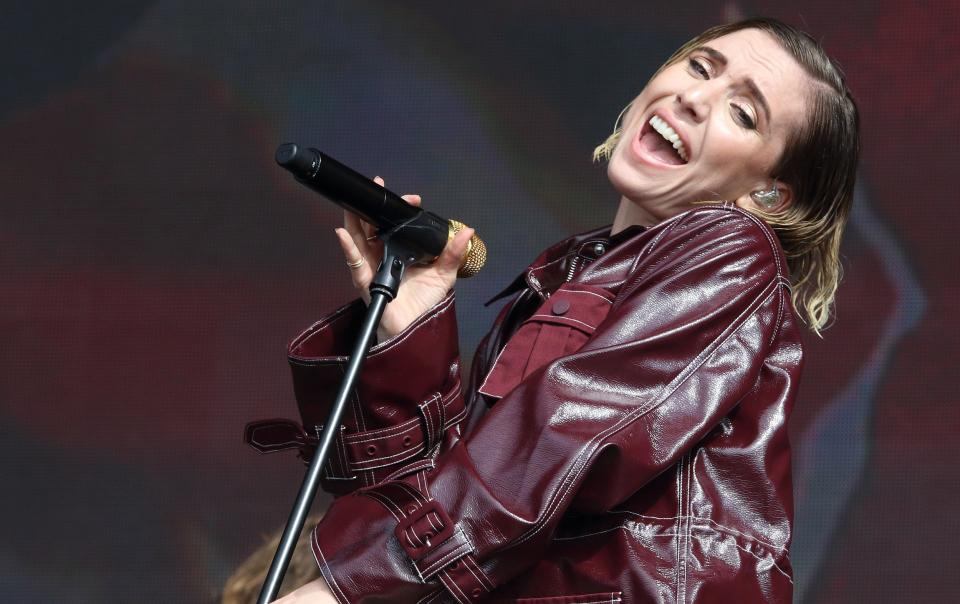Lykke Li: ‘I can’t blame anyone else any longer for my suffering’

“Psilocybin, Ayahuasca, DMT, amongst other things,” says Lykke Li on a call from her home in LA, listing off psychedelics like a black market pharmacist. During the making of her latest audiovisual album EYEYE, she became deeply interested in psychedelic therapy as a means to recircuit the brain, she explains. “But the most powerful drug, I have to say” – and then a slight pause – “is love.”
For as long as she can remember, 36-year-old Lykke Li (born Li Lykke Timotej Zachrisson) has been a “love junkie”. Since childhood, she’s carried around a dreamy, indeterminate sense of heartbreak. Music became a conduit to bridge the void between her fantasies and the world that spins on unromantically indifferent to them. “I was born with heartache, I’ve always been this way,” she sang at 19-years-old, on an early, unrecorded song called Born Blue. “I’ve basically been writing the same song ever since,” she says, laughing.
Since breaking out during the twee end of the late 2000s with her critically lauded debut album Youth Novels, finding mainstream success with 2011’s summer smash I Follow Rivers, and appearing on Mark Ronson’s Late Night Feelings, Li’s music has been unwaveringly fixated on the crossing point between love and heartbreak; beauty and tragedy. There’s even been an element of self-conscious stasis in her work, a stubbornness to unlatch herself from limerence – as exemplified by the title of her third album: I Never Learn (which certainly made it sound as though she never would).
In 2018, when she released her fourth album so sad so sexy, critical favour began to slightly fray. “She still seeks the flood of love before she reaches for the life preserver. But by experiencing that same torrent of emotions again and again, it is beginning to lose its impact,” Pitchfork wrote in their review of the album.
Over 10 years, Li has examined love and heartbreak from hundreds of angles. But now, Li no longer wants obsessive love to be her muse. With the release of EYEYE, she intends to break up with the breakup album.
“I’ve really realised that I can’t blame anyone else any longer for my suffering. It’s really turning the lens back to myself and getting back to the root of why I’ve repeated some patterns,” she says.
From its palindromic title to the seven endless visual loops that accompany the songs, functioning like films within films, little mise en absymes – everything about EYEYE is a perfect circle; an enclosed infinity. Li even made a painstaking effort to get the album’s runtime down to 33:33 (her previous album, I Never Learn clocks in at the same time. Li calls it a “cosmic coincidence”). “I wanted to work with the circular theme so that I could somehow close the circle that I started when I was 19,” she says. “I’m ready to open up a new landscape, even though I am sure I will experience heartbreak again.”
The album, which was largely recorded on a $70 microphone and without a clicktrack, takes place where the real story happened: in her own bedroom, her own home, her own bed. “There was very much a movie in my mind at the time. What I was going through was extremely dramatic,” she says. “Theo [Lindquist], the director for all the films, said: ‘it’s insane, your life is like a f__ing movie’, when I was telling him about what was happening, all the details.” And what was happening? “It’s private,” she says, “and it’s very much in the album.”
But separating fact from fantasy on EYEYE would be a fruitless endeavour. The album is full of Li’s cinematic pleading: she’s up at the crack of dawn, on the doorstep of a man who’s left her for another woman, begging for him to take her back; she drives all over Los Angeles, trying to get a glimpse of him, trying to find a highway to his heart; he loves her only in movies and daydreams, she sings, and she doesn’t want to open her eyes to reality.
Throughout her life, Li has carried around one fantasy in particular: a man pulling her out from a burning car. It’s the defining image of the EYEYE film. “We all dream of someone saving us from our own suffering, I think that’s quite common,” she says. “We all build these fantasies of what love and relationships should be, based on movies, books, myths, fairytales. This is just the fantasy I’ve had since I was a teenager. My teenage fantasy.”
In recreating it, Li hopes to exhume it, put it to rest. “The whole purpose of life is to move forward. Everything you say is meant to be proven wrong,” she says, before stumbling over herself. “That's a blunt statement, I’m sure I’ll have to eat my words.”

But Li is moving forward from heartbreak, from obsessive desire. She meditates. She cooks. She gardens. She shares her life with her son in the Los Angeles home that she refers to as her “safe space” in therapy. EYEYE has opened up a whole new world for her; she wants to try something entirely new, maybe dabble with the visual arts.
Four years ago, when she was last interviewed by The Telegraph, Li said she was sure she was coming to the end of her music career. Reflecting back on those comments now, she clarifies: “It’s not that [I wanted to end my career], it’s more that I didn’t want the commercial pressure of being monetised. That’s not my goal or interest. I just want to make good art and be a good person and have a beautiful life.”
But in the past few years, Li has been considering her purpose and position as an artist at a time when music is treated as a disposable commodity; algorithms dictate taste while listeners absentmindedly skip through playlisted songs until they land on the right “vibe”.
Li has increasingly felt the need to push back against this kind of passive consumption. It’s why listeners will be confronted with three minutes of nothing but the sound of rain during the album’s closer. “I’m really interested in ambient instrumental, maybe I’ll leave the pop format altogether,” she says. “I’m just doing more and more of what I want so I’m curious to see how that reflects in terms of commercial success. Maybe I am just becoming smaller and smaller.”
Li has no interest in courting commercial success, especially today, when achieving it seems to require the selling of one’s self before the selling of one’s art. “I know that in this day and age you have to spend more time online if you want to have success, but in my life I want to send less time online.”
The future she dreams of is offline, though unplugging now seems to be a privilege reserved for the top one perc ent of artists. “I’m sincerely worried,” she says. “I don’t want my kid to be living online. But the world is online.”
Li says living life online encourages people to indulge romanticised versions of reality. “On Instagram, you imagine everyone’s life is happy and beautiful. It’s the same thing as projecting a fantasy,” she says. “When you enter a relationship you start daydreaming about a future, about who you want them to be versus who they are. And then you start asking: What is you? What is him? What is me? What is my past? What am I projecting? What am I hoping and wishing for? What is true? What is not? It’s a hell of a drug.”
EYEYE is out May 20
